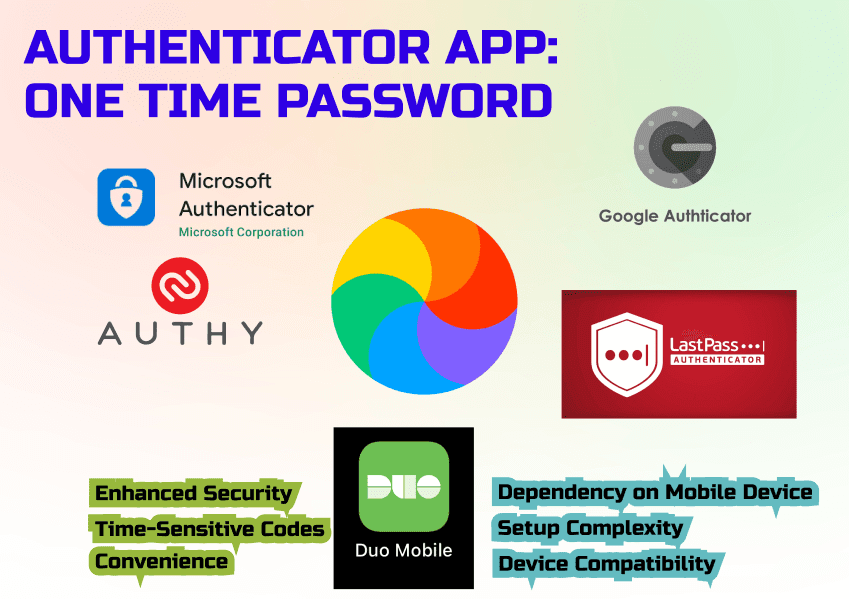An authentication app,
also
known as a two-factor authentication (2FA) app or TOTP (Time-Based One-Time
Password) app, is a mobile application that provides an additional layer of
security for user authentication. It is designed to enhance the security of
online accounts, applications, and services by requiring users to enter a
time-sensitive verification code generated by the app along with their
regular username and password.
Here's how an authentication app
typically works:
Setup: The user installs an
authentication app on their mobile device and associates it with their
online accounts. During the setup process, a unique secret key or QR code is
provided by the service they want to protect.
Linking: The
app scans the QR code or manually enters the secret key to establish a
secure connection or association between the app and the service.
Generating Codes: Once the setup is complete, the authentication app
generates time-based one-time passwords (TOTPs) that are valid for a short
duration, typically 30 seconds. These codes are displayed within the app and
change frequently.
Authentication: When logging in to a
protected account or service, the user enters their regular username and
password, followed by the current TOTP generated by the authentication app.
The service verifies the code's validity, and if it matches, the user is
granted access.
And here are some advantages of using an
authentication app:
Enhanced
Security: Authentication apps provide an additional layer of
security by requiring a time-sensitive verification code on top of the
username and password. This makes it harder for attackers to gain
unauthorized access to accounts, even if they have obtained the login
credentials.
Time-Sensitive Codes: The codes generated by
authentication apps are time-based and expire quickly. This reduces the risk
of someone intercepting and reusing the code.
Convenience:
Authentication apps are typically easy to use and can be accessed from a
user's mobile device. They eliminate the need to carry physical hardware
tokens or rely on SMS-based verification codes, providing a more streamlined
and accessible user experience.
However, there are a few
potential disadvantages to consider:
Dependency on Mobile Device:
Since authentication apps are usually installed on mobile devices, users are
dependent on their devices to generate the verification codes. If the device
is lost, stolen, or not accessible, it may pose difficulties in accessing
the protected accounts.
Setup Complexity: Setting up an
authentication app may require users to scan QR codes or manually enter
secret keys, which could be confusing for some individuals. The setup
process might also vary depending on different services and platforms.
Device
Compatibility: Not all devices or operating systems may be
compatible with every authentication app. Users need to ensure that their
device and operating system support the chosen app.
Overall, the
advantages of using an authentication app, such as increased security and
convenience, outweigh the potential disadvantages. It is an effective method
to strengthen the security of online accounts and protect against
unauthorized access.
And here are some widely used and reputable
authentication apps:Google Authenticator:
Google
Authenticator is a popular and widely used authentication app developed by
Google. It is available for both Android and iOS devices and supports
two-factor authentication for various online accounts.
Explore My Other Channel for More Cool and Valuable Insights
👉 Youtube Learn Tech Tips👉 Tiktok
👉 Facebook:Microsoft Authenticator:
Microsoft Authenticator is another widely used authentication
app that supports two-factor authentication for Microsoft accounts and other
third-party services. It is available for both Android and iOS devices.
Authy:
Authy is a feature-rich authentication app that offers advanced security
features and multi-device synchronization. It supports two-factor
authentication for a wide range of services and platforms, including popular
websites and applications. Authy is available for Android, iOS, and desktop
platforms.
LastPass Authenticator:
LastPass Authenticator is the
authentication app offered by LastPass, a popular password management
service. It provides an extra layer of security for LastPass accounts and
supports two-factor authentication for other online services as well. It is
available for Android and iOS devices.
Duo Mobile:
Duo Mobile is
an authentication app developed by Duo Security, now a part of Cisco. It
offers two-factor authentication and additional security features such as
push notifications and biometric authentication. Duo Mobile is available for
Android and iOS devices.
It's worth noting that the choice of
authentication app may depend on the specific services or platforms you use,
as some services may have their own recommended or proprietary
authentication apps. It's always a good idea to check the documentation or
security settings of the services you wish to protect to see if they
recommend a specific authentication app or have any compatibility
requirements.













